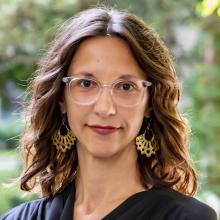Jennifer Iverson, Associate Professor in the Department of Music at the University of Chicago, presents “Porous Instruments: Synthesizers and the Circulation of Cultural Value,” in the first talk of the School of Music's 2023 THEME lecture series.
Abstract
Porous Instruments investigates the production, flow, and meaning of synthesized sound. I argue that electronic music technologies—synthesizers, studios, turntables—fuel the emergence of raced, gendered, and classed sounds, as well as the circulation of social capital. Synthesizers might appear to be black boxes, but they are in fact porous tools for self-fashioning: users constantly intervene with new design affordances, hacks, and off-label (mis)uses. As listeners encounter new synthesized sounds, they navigate a continuum from novelty to ubiquity, ever-inventing new meanings for the electronic sounds that swirl around them. This talk works through several examples, from TPain to Janelle Monae, from Wendy Carlos to J Dilla, and from Deniece Williams to John Chowning, showing how cultural value accrues to synthesized sound. I attend to the outward-moving processes of mobility and circulation, as well as the inward-moving processes of subcultural definition, as I analyze how synthesized sounds flow through several different instruments. Porous instruments mediate the social synthesis of identity, prestige, and cultural value.
Biography
Jennifer Iverson
Jennifer Iverson explores the intersections between music, technologies, systems, people, and history. She is trained as a music theorist, but uses several methods: close reading, archival research, and interviews. She is especially interested in synthesizers, in how electronic sounds circulate, and in how cultural value is produced around them. She is writing a book called Porous Instruments: Race, Gender, and Circulation in Electronic Sound.
Her first book, Electronic Inspirations: Technologies of the Cold War Avant-Garde (Oxford, 2019), analyzes one of the first electronic music studios in Cologne, Germany in the 1950s. She exposes the roles of invisible collaborators and suggests that the studio provided a place to advance not only musical thought, but also for Germany to make post-war technological and cultural reclamations.
Her work in disability studies attends to difficult sounds, especially voices audibly marked as different, disabled, or traumatized. She has written about challenging electro-vocal music by Björk, Milton Babbitt, Trevor Wishart, Luciano Berio, Cathy Berberian, and Alvin Lucier. She is also passionate about disability activism and leads workshops on inclusive pedagogy and facilitates a social music program for middle schoolers at Chicago's City Elementary.
Series Background
THEME, an annual colloquium of UW faculty and students of Theory, History, Ethnomusicology, and Music Education, is held on select Friday afternoons during Autumn Quarter. All talks are at 4:30 p.m in the School of Music Fishbowl unless otherwise noted. Admission is free.
